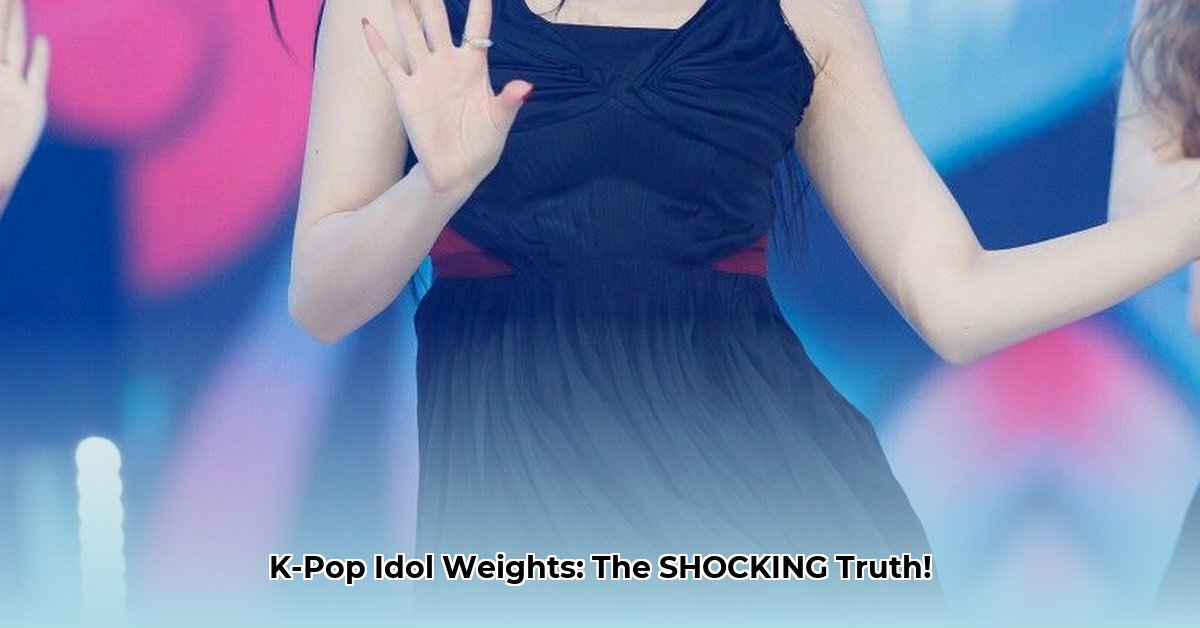Have you ever found yourself wondering about the weight of your favorite K-Pop idols? This seemingly simple question opens a Pandora’s Box, leading to complex discussions about industry pressures, unrealistic beauty standards, and potential health risks. This article dives deep into the world of K-Pop idol weights, examining available data, exploring the stringent expectations imposed by the industry, and considering the ethical implications of these practices.
K-Pop Idol Weight Demystified: Numbers, Averages, and the Pursuit of an Ideal
Obtaining precise weight information for K-Pop idols can be challenging, as it’s often kept private. However, by analyzing various reports, observations, and occasional disclosures, we can establish a general understanding of average weights within the industry. It’s essential to acknowledge that this topic is deeply intertwined with the pressures and pervasive body image expectations prevalent in K-Pop.
- The relentless emphasis on thinness within the K-Pop industry creates immense pressure on idols, fueled by both agencies and deeply ingrained societal beauty standards.
- This pressure can often lead to unhealthy dieting habits and significant mental health challenges, ultimately affecting both the physical and psychological well-being of idols.
- Agencies wield considerable influence, often indirectly, over idols’ body image, with maintaining a specific weight frequently perceived as a non-negotiable aspect of their profession.
Generally, female K-Pop idols tend to weigh between 45 and 55 kilograms (approximately 99 to 121 pounds). Male idols typically weigh between 60 and 70 kilograms (around 132 to 154 pounds). It’s crucial to emphasize that these figures represent averages. Individual weights naturally vary based on factors such as genetics, height, age, and body composition (the ratio of fat, muscle, bone, and water in the body).
| Gender | Weight Range (kg) | Weight Range (lbs) |
|---|---|---|
| Female | 45-55 | 99-121 |
| Male | 60-70 | 132-154 |
“Discussions about specific weights can be inherently problematic because healthy weight ranges differ depending on height, bone structure, muscle mass, and other individual physiological factors,” states [Dr. Sarah Kim, MD, Registered Dietitian], [Director of Nutritional Health] at [The Seoul Wellness Center]. Therefore, it’s important to view these numbers as general estimates and remember that healthy weight is highly individualized.
Weight Management Regimes in South Korea’s K-Pop Scene: Navigating Industry Expectations and Intense Pressures
The K-pop industry places tremendous emphasis on visual appeal, making it a cornerstone of success. Agencies, consequently, often impose unspoken, and sometimes explicitly stated, weight expectations on their idols. This creates a high-pressure environment for both aspiring trainees and established stars, where maintaining a specific weight is often perceived as crucial for career longevity.
Common Weight Management Strategies Employed by K-Pop Idols:
- Dietary Control (Reported Success Rate: Varies): Some idols prioritize balanced nutrition and regular exercise, while others may resort to more restrictive or fad diets, which can potentially be harmful in the long run.
- Rigorous Exercise Programs (Reported Success Rate: High): Intense training regimens are common, often involving a combination of dance practice, strength training, and cardiovascular exercises designed to burn calories and build lean muscle mass.
- Appearance Monitoring (Reported Success Rate: Moderate): The relentless demands of schedules, coupled with constant scrutiny, often result in sleep deprivation, adding another layer of complexity to maintaining the desired physique.
“According to industry insiders, some agencies use proprietary formulas to determine what they consider an ‘ideal’ weight based on individual height, body type, and perceived marketability, further intensifying the pressure to conform,” revealed a recent investigative report by The Korea Times.
The Ripple Effect: Examining the Mental Health Toll, Health Risks, and Ethical Dilemmas of K-Pop’s Weight Standards
The relentless pressure to maintain an extremely slim physique can take a significant toll on the mental and physical health of K-Pop idols. Industry stakeholders, including agencies, media outlets, and fans, share a collective responsibility to promote a healthier and more ethical approach to body image within the K-Pop landscape. The ethical implications surrounding these prevailing weight standards are substantial and warrant critical examination.
The K-Pop system can be unforgiving. Idols often face intense pressure to adhere to a specific, and often unrealistic, body image. This pressure is frequently communicated subtly through comments from trainers and stylists, as well as through the overall pervasive industry culture. The constant scrutiny, with every photo and video meticulously analyzed and judged, creates a breeding ground for anxiety, self-doubt, and body image issues. How do these demanding weight standards impact mental well-being? Sadly, the effects can be profound and far-reaching.
- The K-Pop industry’s emphasis on strict weight management can lead to unhealthy and potentially dangerous practices among idols.
- Extreme dieting and excessive exercise can pose significant health risks, including nutrient deficiencies, chronic fatigue, weakened immune systems, and the development of eating disorders.
- The pervasive focus on achieving and maintaining extreme thinness promotes unrealistic and unattainable beauty standards, negatively impacting idols’ self-esteem, mental health, and overall physical well-being.
“The future of K-Pop should not be defined by unattainable weight standards and unhealthy obsessions. We urgently need a fundamental shift in mindset, moving towards a culture that embraces body positivity, celebrates diversity, and prioritizes the health and well-being of our artists,” asserts [Dr. Ji-hoon Park, PhD, Clinical Psychologist], [Director of the Center for Emotional Well-being] at [Yonsei University Medical Center].
Reimagining K-Pop: Prioritizing Well-being and Advocating for Systemic Change
So, what are the real weights of K-pop idols? The answer extends beyond mere numbers. It encompasses a complex web of industry pressures, health concerns, and ethical considerations. Further research is crucial to fully understand the long-term physical and psychological effects of the stringent weight-management practices prevalent in the K-Pop industry.
The path to positive change begins with collective action, involving fans, industry professionals, and agencies alike. Addressing the ethical dilemma head-on requires a comprehensive overhaul of existing practices. This includes promoting a healthy and realistic body image, providing readily accessible resources and support for idols struggling with body image issues or eating disorders, and prioritizing mental health support as a standard part of artist management. It’s time to create a K-Pop industry that values the well-being of its artists above all else.
- In Home Voice Lessons Near Me Offer Expert Instruction - February 2, 2026
- Find Voice Teachers for Adults Near Me to Start Singing Confidently - February 1, 2026
- Local Voice Coaches Unlock Confidence and Technique for Singers - January 31, 2026










